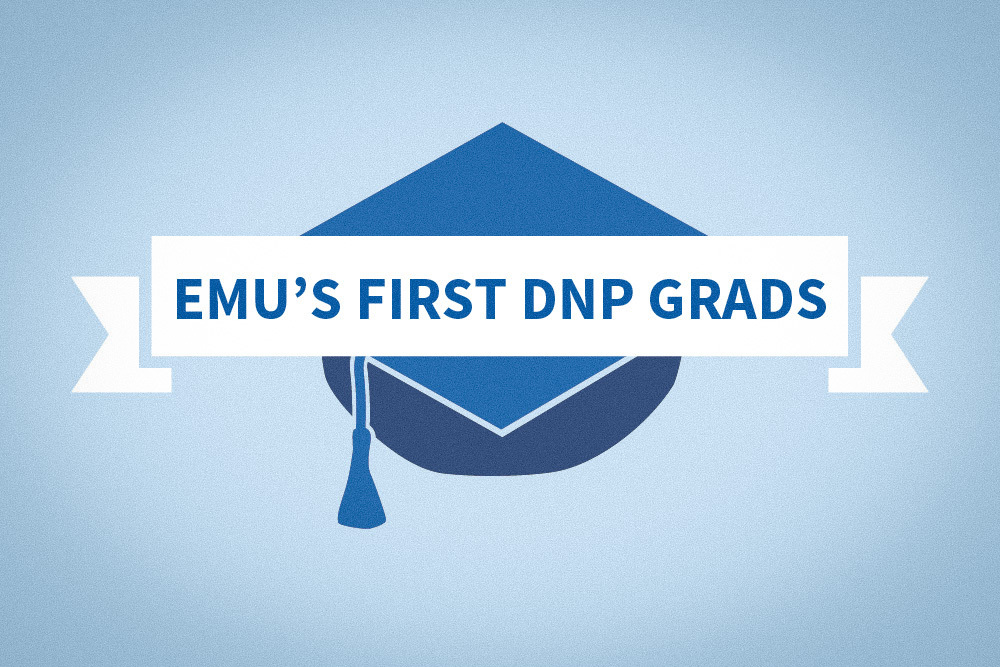Spring 2020 marked the first graduation for seven students in Eastern Mennonite University (EMU) and Goshen College’s joint Doctor of Nursing Practice program. The grads are from three states and work in nursing education, hospital administration, family practice, and the public school setting.
The new program was accredited by the Commission on Collegiate Nursing Education last year. Its aim is to prepare nursing professionals to lead within dynamic healthcare systems.
“Creating this program was an amazing, challenging and energizing experience,” said program co-director Melody Cash, who teaches nursing at EMU. “When we gathered our first cohort together for our in-person residency, there was such a sense of excitement and realization of a dream. The cohort of students bonded immediately and stood ready to tackle the program together.”
Co-director Ruth Stoltzfus, a professor at Goshen College, said that graduates of the program “are well positioned to identify areas in their place of employment where innovations are needed,” and leave “prepared to be change agents.”
The program requires intense coordination between the institutions, but benefits from expertise across faculty.
“There are so many things that give me joy in this partnership. One of the biggest joys is the people at EMU,” Stoltzfus said. “I think that Melody and I complement each other in our gifts that we bring as program co-directors.”
“We are often thinking the same thing at the same time,” Cash agreed. “We are of one mind. When we occasionally have different viewpoints, we talk it out and come to compromise without difficulty.”
Meet the graduates below.
Mary K. Bowser
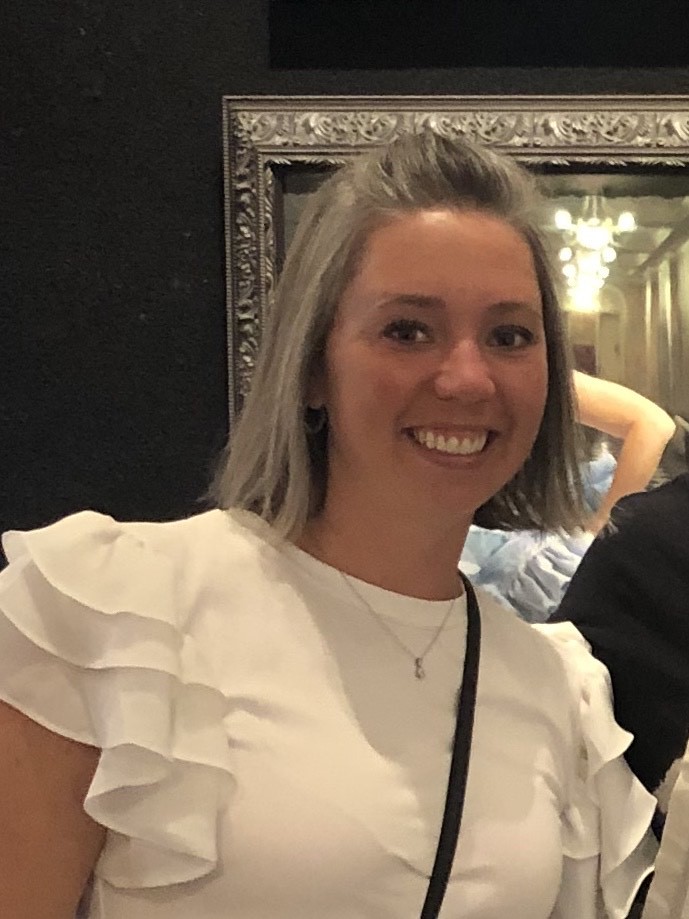
Mary K. Bowser hails from Harrisonburg, but has been working in and studying from Greenville, South Carolina, where she works in clinical nurse education at Prisma Health. She will relocate soon to Roanoke to work on the clinical decision unit at Carilion Clinic.
“Mary K. brings a lot of energy to the program,” Cash said. “Her recent experience as a bedside nurse drives her to create change that drives improved patient outcomes for mothers and babies!”
“Despite all of her transitions, Mary K has kept a positive spirit,” Stoltzfus said. “She has a passion for enhancing the safety of women during delivery and immediately after-delivery.”
Bowser’s DNP project, “Application of a Nurse-driven, Evidence-based Change Project to Quantify Blood Loss at Delivery,” was partially implemented at Prisma before the pandemic. The project changes the way healthcare providers estimate new mothers’ blood loss from giving birth, better quantifying it so they more quickly diagnose serious postpartum hemorrhage.
“I think that’s really important about the DNP program … to really do something that affects patient care,” Bowser said. She especially appreciated the organizational leadership class taught by Professor Don Tyson, which “closed the loop” in her understanding of “how to be a more effective leader.”
Joan Deal
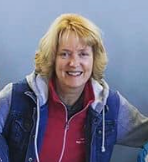
Joan Deal of Lynchburg, Virginia, is the vice president of acute care nursing at Lynchburg General Hospital. Deal was drawn to that line of work because she loves “working to positively influence the work environment of our nursing caregivers and our patient outcomes.”
Cash noted that Deal’s management role in such a large healthcare system comes with long hours and a multitude of responsibilities. “Joanie’s position as a nurse leader is very demanding, yet she somehow manages to balance her role with a challenging academic program,” she said.
“Joanie is a leader and a manager and a nurse. Even though she no longer works as a point of care (bedside) nurse, she has not lost sight of patient needs and safety measures,” Stoltzfus added. “That is a driving force behind her project.”
Deal’s DNP project, “Use of a Needs Assessment to Design a Mobility Program,” also morphed due to COVID-19. In response, she’s been working on a needs assessment and gap analysis around patient movement, “with the planned project deliverable to be a plan for a comprehensive patient mobility plan. The ultimate goal for later implementation of this plan is to reduce hospital-associated injuries such as pressure injuries and fall, and to reduce length of stay for patients.”
She said the program has helped her connect “best practices from literature, clinical experiences, and patient values into everyday practice,” and taught her how to implement change.
“As leaders we are always embracing and encouraging others to embrace organizational changes,” Deal said. “This program has helped me to better understand the differences between ‘change’ and ‘transition.’ From my studies I hope and believe I am becoming a more compassionate leader.”
Pam Dressler
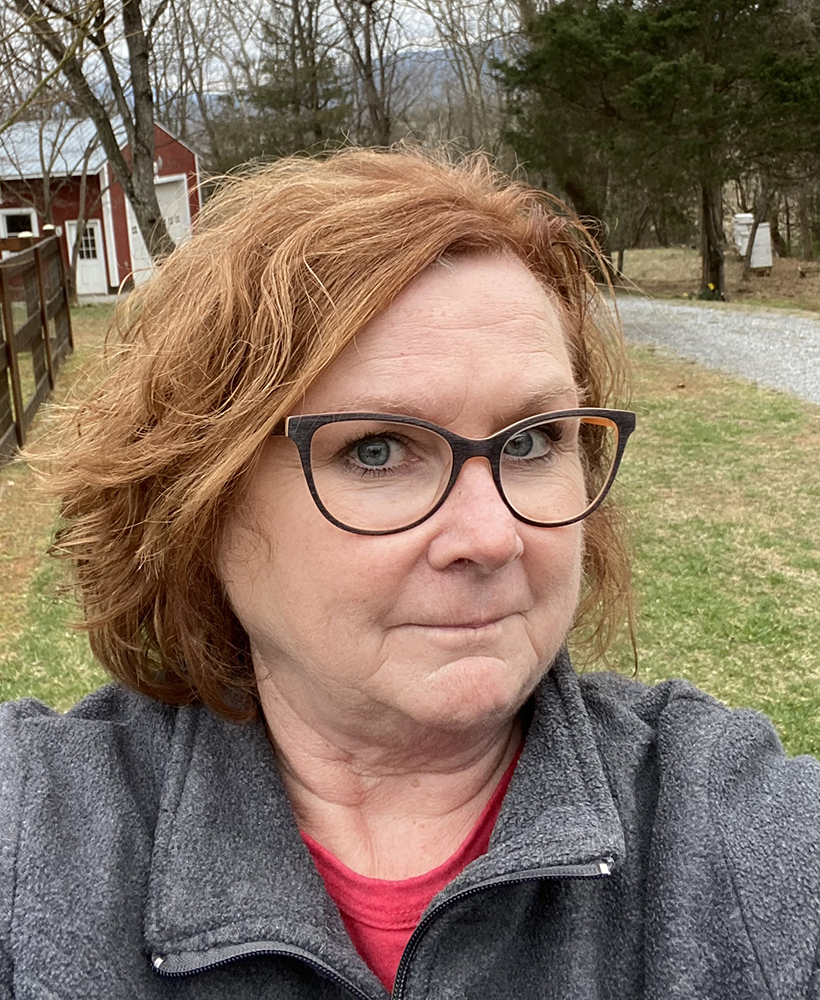
Pam Dressler teaches in the Murphy Deming College of Health Sciences, School of Nursing at Mary Baldwin University in Staunton, Virginia.
“Pam has a passion for evidence-based practice. She was able to connect this passion with the needs of an organization allowing her to slip seamlessly into her DNP project,” said Cash. “Pam is level-headed, thinks critically and has high expectations.”
She added that Dressler has participated in the program’s management oversight board meetings and provided valuable feedback as faculty and staff fine-tune the program.
Stoltzfus said Dressler is “a systems-thinker and an educator. She always seems so serious but beneath that seriousness is a layer of humor that bubbles up at the right time.”
“Throughout my long career in nursing, I have enjoyed teaching others as they entered or advanced in the nursing profession, which is a unique appointed position to serve others,” Dressler said. She feels the DNP program has advanced her “practice of nursing as a nurse educator.”
Her project, “Readiness and Resistance, Building a Culture of Evidence-Based Practice in Nursing: A Community Hospital Approach,” is a “direct approach to improving patient outcomes through making clinical decisions from the best possible evidence,” she said.
Dianne Hannak
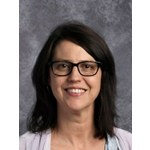
Dianne Hannak is a certified school nurse in the York Suburban School District near her home in New Freedom, Pennsylvania.
“She cares deeply for her students and for the staff that help her care for them,” said Cash. “Dianne sees the effects of trauma on kids on a daily basis which led to her DNP project. It is so encouraging to see a school nurse pursue a DNP. We need school nurses practicing at this level and with the skillset that the DNP prepared nurse brings to the role.”
“I love being a school nurse because I know that a healthy learning is a better learner and we are in the ideal position to help support students and families and fill gaps in health care that often go unnoticed,” Hannak said.
Her DNP project, titled “Trauma Informed Care in School Health,” addresses one of those very important gaps. Through it, she’s introducing mental health training and a trauma-informed care toolkit to school nurses in her district so they can “help support the social and emotional needs of students who visit the health room.”
Hannak fondly remembers her statistics course with Professor Daniel Showalter, which was a subject she used to avoid. Now, though, “I want to work more with data collection and analysis to help support the very important role that school nurses have in caring for the physical and emotional well being of students. The skills that I learned in this course will benefit me in so many ways,” she said.
Deena Elizalde
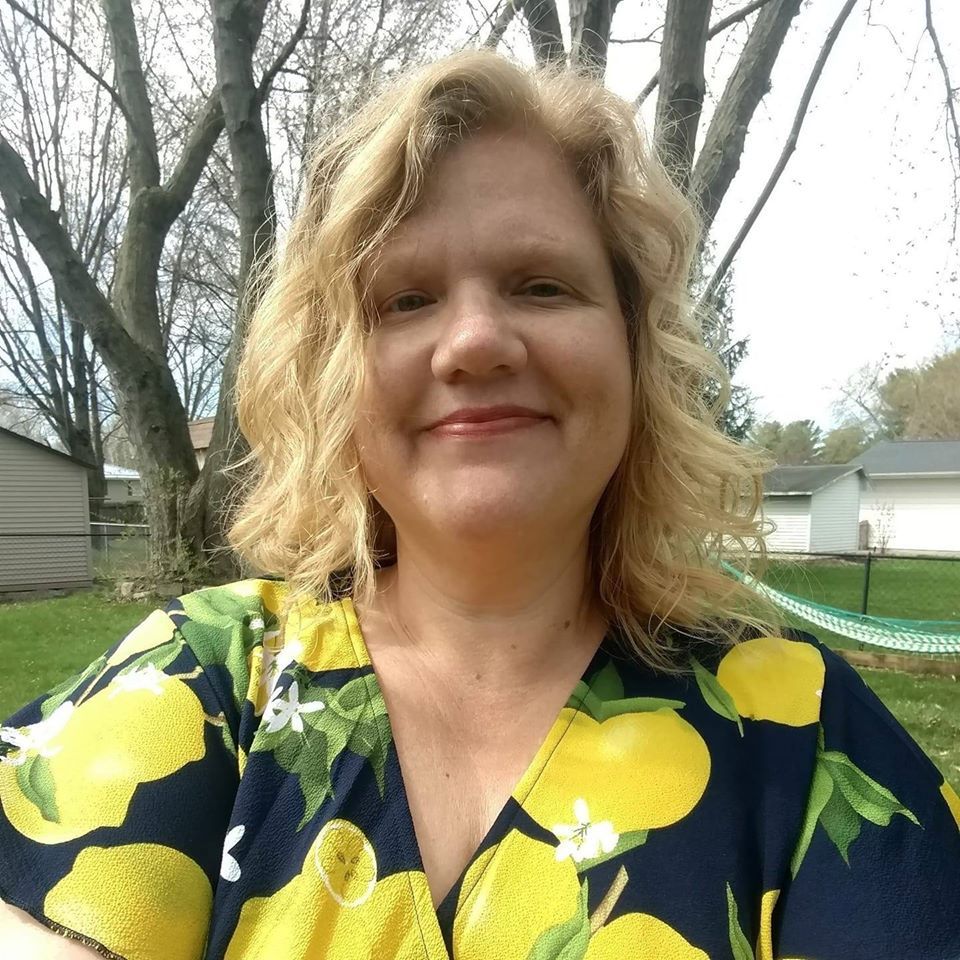
Deena Elizalde of Goshen, Indiana, is a family nurse practitioner at Goshen Family Physicians. For 13 years, Elizalde has cared for a variety of patients, with clinical expertise in primary care.
“Deena has successfully balanced her professional world of practicing as a FNP in private practice, her private world of being a single parent of two teenage children, and her academic world of being a doctoral student as well as preparing to teach a course that she developed,” said Ruth Stoltzfus, co-director of the program.
Elizalde’s DNP project focused on the development of a mental health course for Primary Care Family Nurse Practitioners. The course has been implemented at Goshen College, where a “Mental Healthcare for Advanced Practice Registered Nurses” course is currently being taught.
“As a preceptor for GC family nurse practitioner students for many years, I was familiar with faculty and the program, and was delighted to be considered to help with the new course,” she said. “I am hopeful that as we improve education for FNP students, we will ultimately improve mental healthcare.”
Patti Gasper
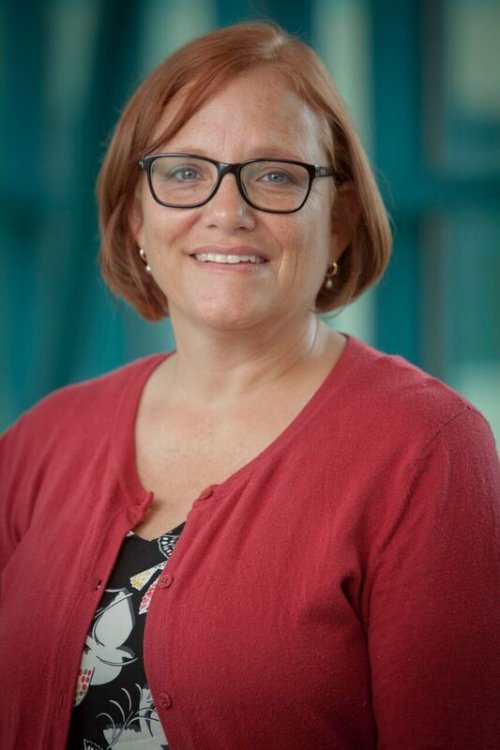
Patti Gasper of Elkhart, Indiana, has been a nurse for over 26 years, with a specialty in cardiology. She is currently employed by Beacon Advanced Cardiovascular Specialists in South Bend.
“I am passionate about working with patients with cardiac arrhythmias, in particular atrial fibrillation,” Gasper said. “I believe that women need better access to all cardiovascular care across the lifespan as evidence is emerging regarding the effects of childbearing and other female-specific issues on heart health.”
Gasper’s passion and understanding of important classroom concepts have been apparent during her time in the DNP program.
“Patti can be very quiet in class, but when she speaks, she speaks wise words that hit the heart of the matter,” Stoltzfus said. “Patti seems to be able to effortlessly write in a scholarly manner as well as engage in clinical and academic conversations in a professional manner.”
“I feel blessed to have learned a great deal through the course of this program, particularly the skills to serve at the forefront of efforts to implement new models of care delivery to improve patient care,” Gasper said.
Gasper’s DNP project, “A Competency-Based Checklist to Facilitate Transition for Novice Nurse Practitioners in Cardiology,” provides a cardiology-specific checklist during orientation, working to improve patient access to timely cardiovascular care.
“The first year of nurse practitioner practice is a particularly vulnerable period for new graduates,” Gasper said. “Evidence in the nursing literature suggests that if this transition from expert nurse to nurse practitioner is not well supported, new practitioners may not only feel frustrated and isolated, but may also choose to leave their positions. This is not only costly to a healthcare system, but may leave patients without access to a provider.”
Later this month, Gasper will present her project to the American College of Cardiology section for advanced practice nurses.
Jewel Yoder
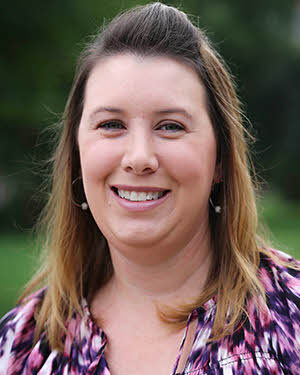
Jewel Yoder teaches at Goshen College in Goshen, Indiana, where she anticipates starting her new role as chair of the nursing department this July. She also serves as the director for the BSN and RN-to-BSN programs.
“Without this program I certainly would not have had the qualifications to be promoted to department chair,” Yoder said. “So, it is a launching point for me to continue to expand my nursing leadership skills in the academic arena.”
“I’m eagerly looking forward to working with Jewel in her new role,” said Cash. “She brings a passion for nursing education that will make her a great colleague.”
Yoder’s project, “Seamless Academic Progression in Nursing an ADN to MSN leadership Program Development,” is working to build a new nursing leadership program using existing resources at Goshen College. This project also focuses on seamless matriculation from the associate degree to the master’s degree.
Yoder says if all comes together as planned, the program will be considered for launch in the 2022-23 academic year.
“There is such joy in the pursuit of knowledge,” Yoder said. “That following your passion and being empowered to create change is meaningful and yet hard work.”
